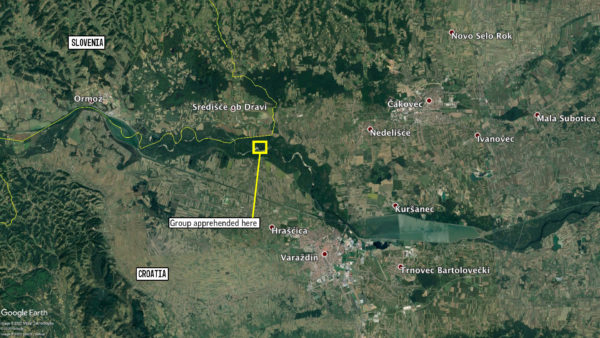They kill me if they hear my voice. If they kill me it is no problem because I can’t live like this.
| 15.08.2020 | Near the River Drava, Croatia | No Name Kitchen | 46.3716868, 16.2869572 | Croatia | Bosnia | no | no | yes | yes | no | no | no | 14 - 30 | 15 | Eritrea | 10 | exposure to air condition and extreme temperature during car ride, reckless driving | 10 Croatian officers 3 women and 6 or 7 men in light blue and dark blue uniforms, one van. |
On around the 15th of August a group of 28 people from Eritrea were resting in the forest near the border between Croatia and Slovenia. The group consisted of all men including 9 people under the age of 18, the youngest was 14. The respondent was a man in his early 20s. They were waiting to cross the River Drava when they were found by police. The respondent described more than 10 officers dressed in light blue uniforms. There were 3 women officers and between 6 and 7 male officers. When the police came, some of the group ran away into the trees - around 13 fled and evaded capture and 15 people remained. The police told the remaining group to lie down and take off their shoes. They were later permitted to put their shoes back on. The respondent reported that the police did not take any of their mobile phones - which surprised him as often the Croatian police take or break phones.
[caption id="attachment_15657" align="aligncenter" width="600"] The approximate location outside of Varaždin where the group described being apprehended by Croatian authorities on the 15th of August[/caption]
The respondent described the group of fifteen people soon thereafter being put in the back of a van which was the size of a minibus but had no windows. According to the respondent, the conditions inside of the car were terrible:
“[If] someone needed to kill you they use this car. Some people were feeling the need to die in this car.”
The journey in the back of the van took around 3 hours, during which time the vehicle drove them directly back to the Bosnian-Croatian border. Once they arrived, they were ushered out of the vehicle in a forested area near the border and told to walk. Despite having their mobile phones, no one had them charged, so it took them 17 hours to find their way to the town of Velika Kladuša.
The respondent was keen to say that he is searching for peace, not for money. He gave consent to this report to be written but was extremely insistent that the voice recording used to collect the data remain private:
“They kill me if they hear my voice. If they kill me it is no problem because I can’t live like this.”
The approximate location outside of Varaždin where the group described being apprehended by Croatian authorities on the 15th of August[/caption]
The respondent described the group of fifteen people soon thereafter being put in the back of a van which was the size of a minibus but had no windows. According to the respondent, the conditions inside of the car were terrible:
“[If] someone needed to kill you they use this car. Some people were feeling the need to die in this car.”
The journey in the back of the van took around 3 hours, during which time the vehicle drove them directly back to the Bosnian-Croatian border. Once they arrived, they were ushered out of the vehicle in a forested area near the border and told to walk. Despite having their mobile phones, no one had them charged, so it took them 17 hours to find their way to the town of Velika Kladuša.
The respondent was keen to say that he is searching for peace, not for money. He gave consent to this report to be written but was extremely insistent that the voice recording used to collect the data remain private:
“They kill me if they hear my voice. If they kill me it is no problem because I can’t live like this.”
